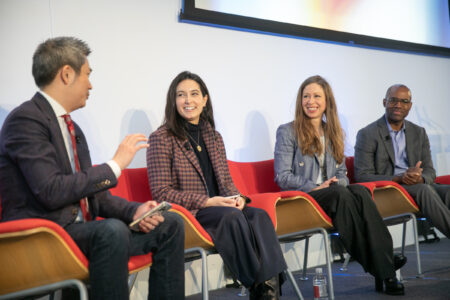Cornell Tech’s Second Annual HealthNext Summit Convenes Health Tech Leaders to Explore Applications of AI in Healthcare
Categories

Cornell Tech’s HealthNext 2024: AI convened more than 300 stakeholders from academia, industry, and government to foster collaboration in building a nexus of health technology innovation in New York City. Over two days, speakers, panelists, presenters, and attendees gathered on Cornell Tech’s Roosevelt Island campus in New York City to explore responsible uses of AI in healthcare.
Empowering Patients and Providers Through Tech
It’s empowering for individuals and communities to have access to their own health data. At HealthNext, Apple’s Vice President of Health Dr. Sumbul Desai reflected on the formative experience of caring for her mother after a stroke, which inspired her to go into medicine and explore ways to help patients and caregivers better manage their health.
“[At Apple], we don’t want to provide data for data’s sake,” said Dr. Desai. “We want that information to encourage individuals to be empowered, to be able to take an action based on that insight.”
But the potential for technology to empower healthcare providers remains an open question. AI tools could automate administrative tasks and lighten workloads, but Chief Global Information Officer of Curtis Cole voiced skepticism that these efficiencies will actually improve the lives of doctors.
“I thought EHR was going to create more time and efficiency for me to see patients,” said Cole. “Boy, was I wrong. It made me more efficient at billing. It made me more efficient at doing a whole bunch of things that my employer benefits from, that the insurance company benefits from, that society benefits from, and guess what I have to do? I have to see more patients.”
Protecting Privacy in a Digital Age
While AI and other technologies can empower people to take control of their health, concerns about privacy in the digital age remain top of mind. Board Member of Keystone Strategies Virginia McFerran explained that attackers are getting more and more successful at stealing companies’ data, and AI only makes it easier for them
to “screen scrape” websites like LinkedIn to create convincing scams.
“It’s a war out there,” McFerran said, urging tech companies to know what their policy is ahead of time so that they can act quickly in the event of a data breach. “That means encrypting your data, it means keeping logs granular, it means being responsive.”
At the same time, data sharing and interoperability will be integral to research and healthcare delivery. Micky Tripathi, PhD, MPP, the National Coordinator for Health Information Technology for the US Department of Health & Human Services, discussed the challenge of data sharing in the private sector, given that competition between companies may result in information blocking. The policy response to this challenge, Tripathi explained, is that unless information is confidential, institutions are required by law to share data with one another to improve patient care.
Exploring the Nuances of Consent and Confidentiality
The role of consent in healthcare is critical yet complex. Information Science Professor Helen Nissenbaum described her theory of contextual integrity, which notes that given the complexity of health data, the lay population may not fully understand what they are giving consent for in a medical context. Healthcare inequities exacerbate this issue; NYU Bioethics Professor Art Caplan noted that access to the latest health technology varies widely even in a wealthy, technologically sophisticated country like the US.
“You don’t have opportunity to maximize your aptitudes and skills and abilities… if you don’t have health,” said Caplan. “So to me it’s a right, not a privilege… That means that you’ve got to build in equity concerns at the research side.”
Investing in a Better Future
HealthNext explored the dynamics of investment in AI innovations. Deputy Director of ARPA-H
Susan Monarez offered a government perspective, explaining her department’s “high-impact” investment s
trategy, funding some of the most challenging health problems of our time. “The bottom line is…we would like to allow people to explore a [high] risk space in their academic settings,” giving them the freedom to explore transformative solutions on a longer time scale.

Vice Chair of the Clinton Foundation Chelsea Clinton, DPhil, MPH urged the audience of founders, researchers, and innovators to consider public service as part of their career trajectory.
“Optimism is a moral choice, and it’s a moral choice how we use what we’re afraid of and build better for tomorrow,” said Clinton. “Whatever brought you here, you fundamentally care about what happens tomorrow… So think about what you want to invest in and what you want to build, and think about whether or not you want to run for office.”
Applying AI in Healthcare
Many health tech startups are already successfully exploring applications of AI technologies in healthcare. Biotia, a startup launched out of Cornell Tech’s Runway Startups Program, uses AI to fight against infectious diseases, addressing a problem that kills 14 million people annually. Another startup, Abstractive Health, is working to lighten physicians’ workloads by automating administrative tasks like note taking. These are just two examples of the revolutionary new approaches coming out of the startup world.
Pessimism or Optimism?
Throughout the Summit, conversations returned to the question of pessimism versus optimism. Concerns about data privacy and bias in machine learning models, for example, must be weighed against the potential benefits to operational efficiency and reducing administrative burden on clinicians. The emergence of AI in healthcare could also be an opportunity for us all to rethink and reshape our healthcare systems for the better by finally including those who have been historically excluded from conversations and research.
HealthNext 2024 convened thinkers and doers of different backgrounds and skill sets, and attendees witnessed the transformative power a diverse group of people can have in improving the future of healthcare.
The HealthNext Summit is an initiative of the Health Tech Hub at Cornell Tech’s Jacobs Institute. To learn more and get updates about next year’s Summit, visit the website and sign up for the newsletter.





